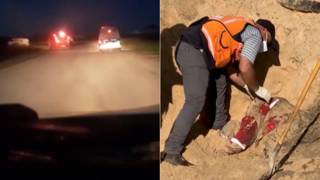
After five months in detention with her two-year-old son, Kenia Galeano joined a hunger strike with about other 70 mothers to push for their release. Today she described how she and several others were held in isolation as punishment.
“Inside this room it was really cold. It was dark. The toilet was right next to the bed. My son was in there with me this entire time,” Galeano said.
She also recalled threats that families would be separated if the strike continued.
“A guard told us if we didn’t eat we would not be equipped to take care of our children, and risked having them taken away,” Galeano said.
The women ended their strike on April 3 but now ten more have vowed to begin again Wednesday to refuse to eat except for one meal each evening. Like last time, they want bond hearings so they can be free while seeking asylum, as well as improved food and conditions at the Karnes County Residential Center in Texas, which is run by the private prison company, The Geo Group.
Galeano, who is from Honduras, was released on a $7,500 bond after the hunger strike ended. Her family paid $3,000 and the rest was supplemented by the Family Detention Bond Fund. But she said she can’t stop thinking about the hundreds of women she left behind, like her cellmate who had an eleven-year-old son.
“I saw how much her son really suffered in detention… He didn’t want to go to school, couldn’t sleep. He would hide under the covers,” Galeano said.
Her roommate is part of a category of detained mothers who have been refused bond because they were previously deported. Democracy Now!’s Renée Feltz observed this pattern in March when she visited the immigration courts in San Antonio where women appeared via a video monitor from detention.
“It was an interesting Catch-22, because [the judge] would offer a bond to their child, but he would say that ‘you’re not eligible for relief.’ So, your child’s release is conditional on your release; you’re not getting out, therefore your child’s not getting out.” See more here.
On Tuesday immigration advocates delivered a petition to the Immigration and Customs Enforcement headquarters in Washington, D.C. asking ICE Director Sarah Saldaña to lift the ban on bonds for women who have been deported before as part of their “deterrence strategy.”
The retaliation faced by the detained mothers echoes a pattern of pushback by ICE and prison authorities against their advocates on the outside. One of the sources for a March report by Democracy Now! on family detention has since been denied access to Karnes. A paralegal who wrote a critical essay about Karnes in The Texas Observer was also blocked from further visits.
Two incident reports provided to Democracy Now! show a group of Karnes detainees tried to draw the attention of a helicopter that flew overhead on April 2 by making large letters on signs that spelled out “libertad” which means liberty. Staff who documented the incident called it an “insurrection.”
On May 2 a nationwide protest is planned outside the South Texas Family Residential Center in Dilley, Texas, the other facility where hundreds of women and children have been detained since seeking asylum from violence in Central America. The event will kick-off a week of actions that end on Mother’s Day.
An organizer with the We Belong Together campaign frames family detention as an issue central to women’s struggle for equality.
“These women are blocked from achieving their full potential because of deeply flawed immigration policy,” said Andrea Cristina Mercado.
Click here to see Democracy Now!’s report on the South Texas Family Residential Center that includes an interview with a mother and her son who were held in isolation for a week. You can also watch the report in Spanish.
Our report noted nearby Crystal City, Texas, was home to a federal internment camp for Japanese and German men, as well as their wives and children, and a local newspaper has referred to the South Texas Family Residential Center as an internment camp despite objections by Corrections Corporation of America, the private prison company that operates it.
Advocates say the comparison of that facility to present day family detention centers in Texas could haunt President Obama.
“He could go down in history not just as the deporter in chief,” said Cristina Parker, with the group Grassroots Leadership, “but as the president who presided over the return of modern day internment camps on U.S. soil.”











Media Options